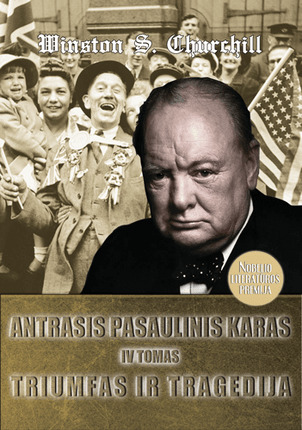What do you think?
Rate this book


483 pages, Hardcover
First published January 1, 1950
I have called this volume The Hinge of Fate because in it we turn from almost uninterrupted disaster to almost unbroken success. For the first six months of this story all went ill; for the last six months everything went well. (p. vi)
Moral of the Work
In War: Resolution
In Defeat: Defiance
In Victory: Magnanimity
In Peace: Good Will
Theme of the Volume
How the power of the Grand Alliance become preponderant
This new year of the Second World War, 1942, opened upon us in an entirely different shape for Britain. We were no longer alone. At our side stood two mighty Allies, Russia and the United States were, though for different reasons irrevocably engaged to fight to the death in the closest concert with the British Empire. This combination made final victory certain . . . (p. 3)
...In a few minutes he [general Ismay] brought the following message, which had just arrived from Admiral Harwood at Alexandria.
“Tobruk has fallen, and situation deteriorated so much that there is a possibility of
heavy air attack on Alexandria in near future…”
This was one of the heaviest blows I can recall during the war. Not only were its military effects grievous, but it had affected the reputation of the British armies. At Singapore 85,000 men had surrendered to inferior numbers of Japanese. Now in Tobruk a garrison of 25,000 (actually 33,000) seasoned soldiers had laid down their arms to perhaps one-half of their number. If this was typical of the morale of the Desert Army, no measure could be put upon the disasters which impended in Northeast Africa. I did not attempt to hide from the President the shock I had received. It was a bitter moment. Defeat is one thing; disgrace is another. Nothing could exceed the sympathy and chivalry of my two friends. There were no reproaches; not an unkind word was spoken. “What can we do to help?” said Roosevelt. (p. 382-3)
I hope the crisis will lead to all uniformed personnel in the Delta and all available loyal man-power being raised to the highest fighting condition. You have over seven hundred thousand men on your ration strength in the Middle East. Every fit male should be made to fight and die for victory. There is no reason why units defending the Mersa Matruh position should not be reinforced by several thousands of officers and administrative personnel ordered to swell the battalions or working parties. You are in the same kind of situation as we should be if England were invaded, and the same intense, drastic spirit should reign. (p. 389)
… you should insist upon the mobilisation for battle of all the rearward services. Everybody in uniform must fight exactly like they would if Kent or Sussex were invaded. Tank hunting-parties with sticky bombs and bombards, defence to the death of every fortified area or strong building, making every post a winning-post and every ditch a last ditch. This is the spirit you have got to inculcate. No general evacuation, no playing for safety. Egypt must be held at all costs. (p. 425-6)
Prime Minister to General Ismay, for C.O.S. [Chiefs of Staff] Committee 4 Mar. 43
I feel so very conscious of the poor contribution the British and American Armies are making in only engaging perhaps a dozen German divisions during the greater part of this year while Stalin is facing 185, that I should not be prepared myself to court the certain rebuff which would attend a request for information as to his plans. (p. 935)
…3. 1,700,000 is the figure given for men in the Home Guard. My latest figure is 1,450,000, of which only 840,000 have rifles. Of course those with rifles are relieved by those without, and they all ought to be trained, but surely the emphasis should be on getting a number trained in shooting equal to the rifles issued. Let me know what is the plan about this.
4. I still think that, in view of the immense quantities of .30 ammunition now being produced in America – 319,000,000 rounds in March, for instance – we ought to try to get another 100,000,000 over to improve holdings of the Home Guard and for practice. I should be willing to make an effort for this… (p. 859)
Your latest returns shows that you have 1797 [aircraft] “in preparation.” These are presumably in addition to the 649 ready, and ready within four days. The shortage of aircraft at the present moment is acute. Now is the time for you to bring forward this reserve of 1797, which are presumably defective in this or that spare part.
Lord Beaverbrook in 1940 gained great advantages for us by a searching analysis and scrutiny of the machines in the Air Supply Units. What we want now is more aircraft in the front line. Get at it and bite at it. (p. 860)
I have read with great interest your note describing what has been achieved in the man-power field during the year ended last June.
I see that you drafted nearly a million men and women into the Services, thereby fulfilling the great bulk of their requirements, and at the same time added 800,00 to the labour force on munitions.
I congratulate you on this great performance. (p. 901)